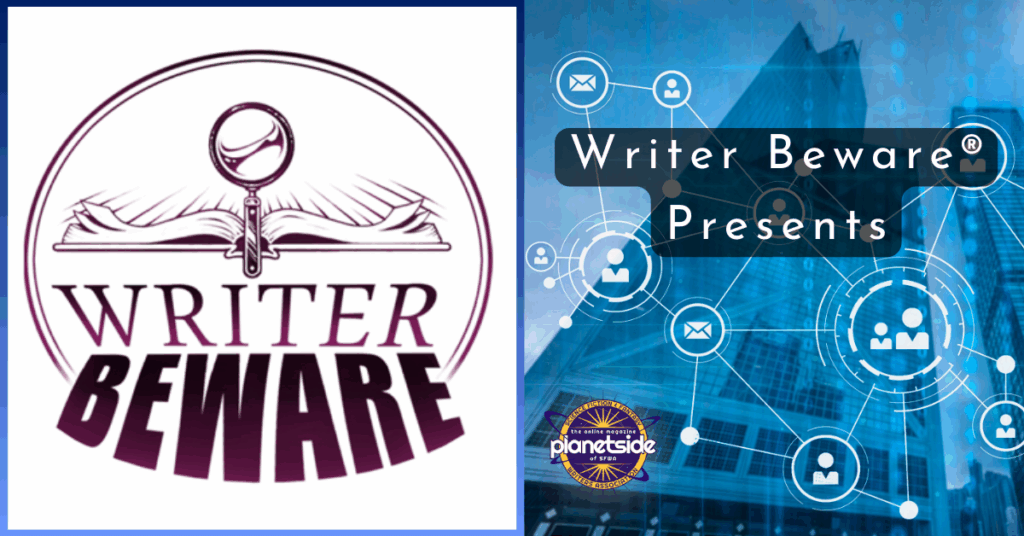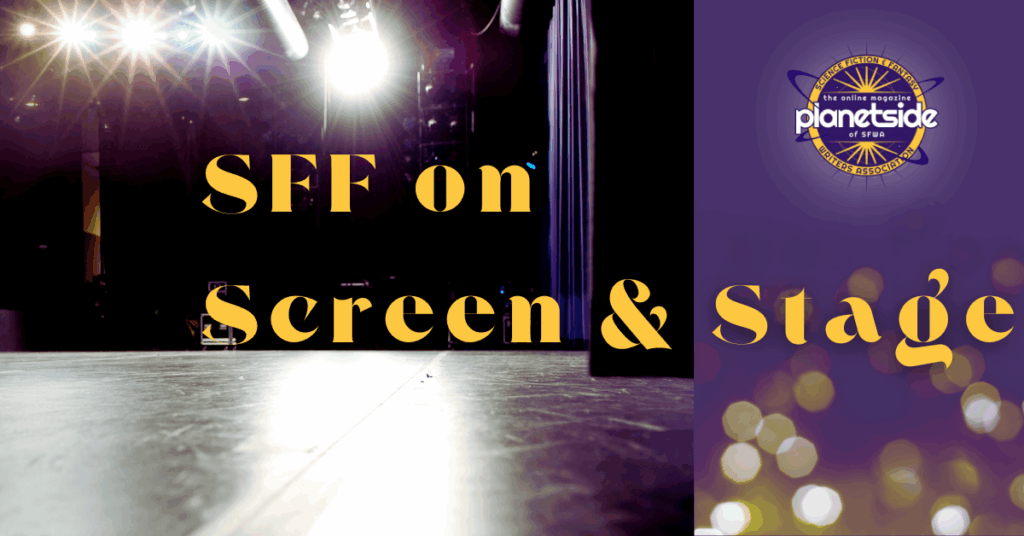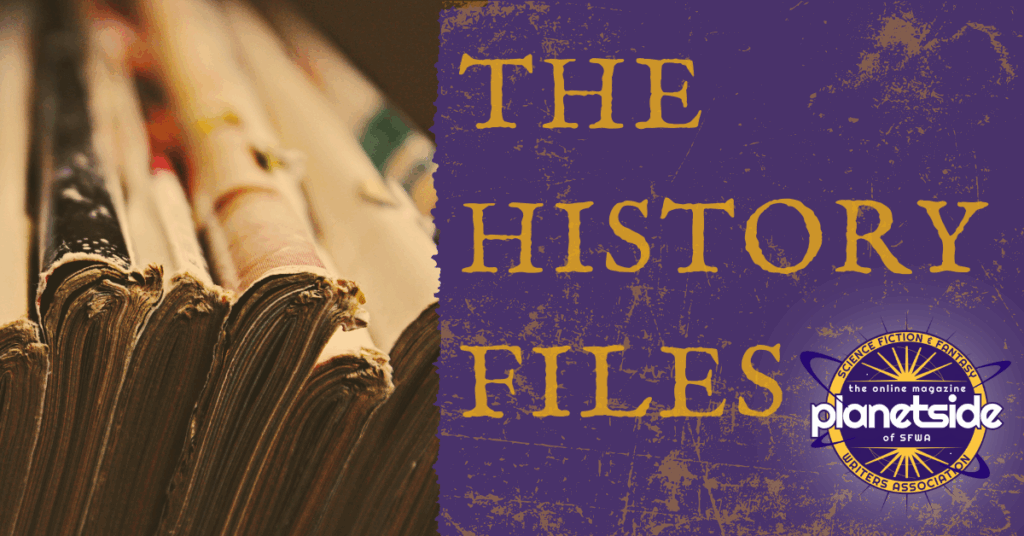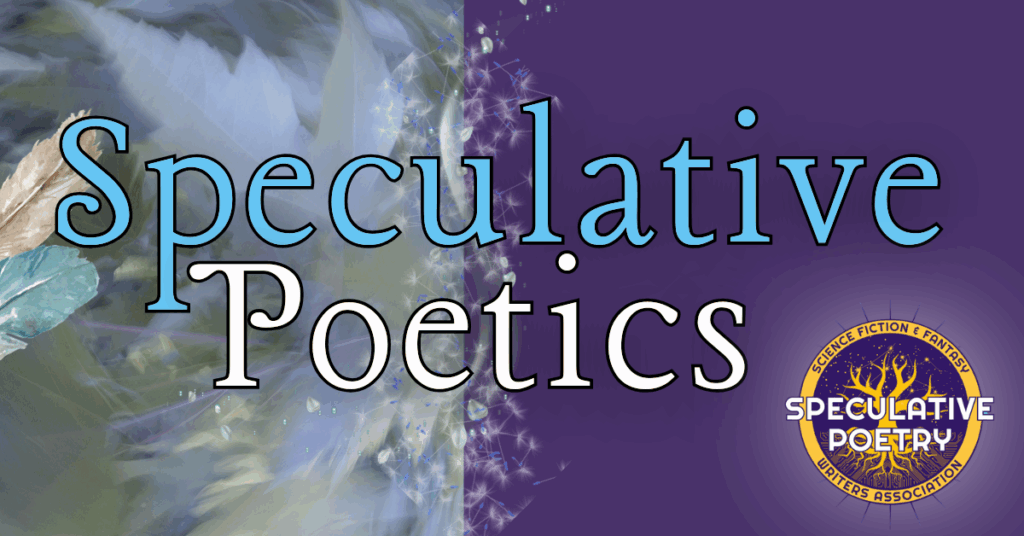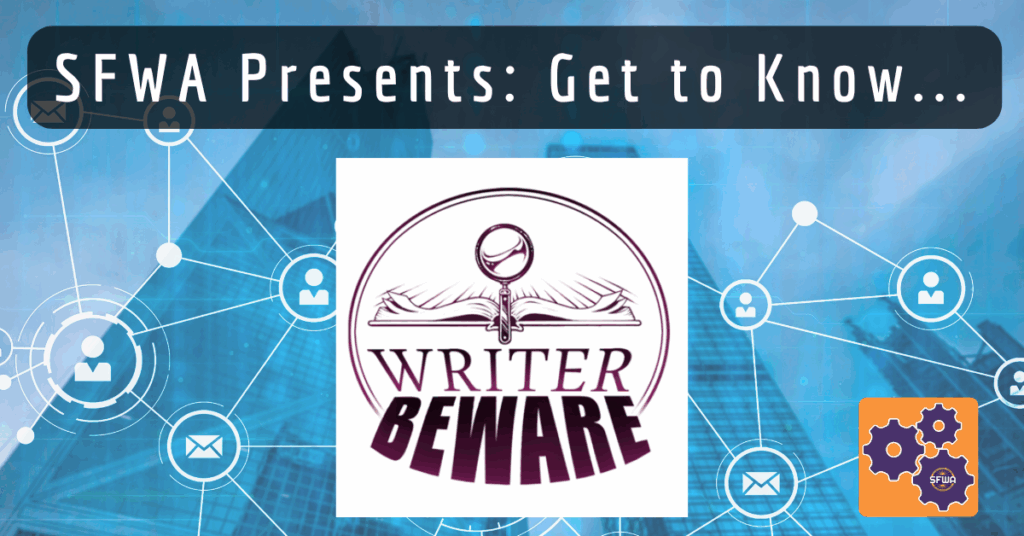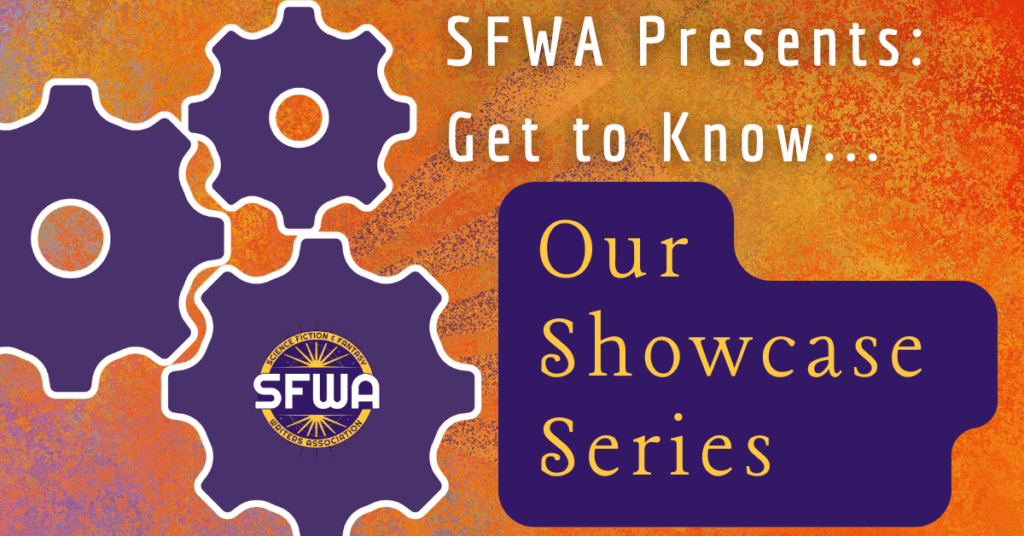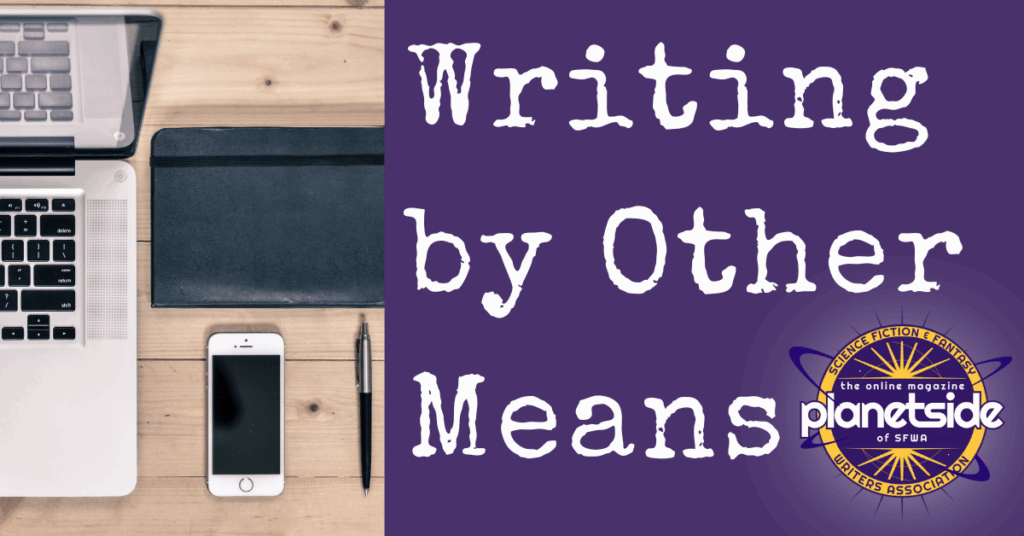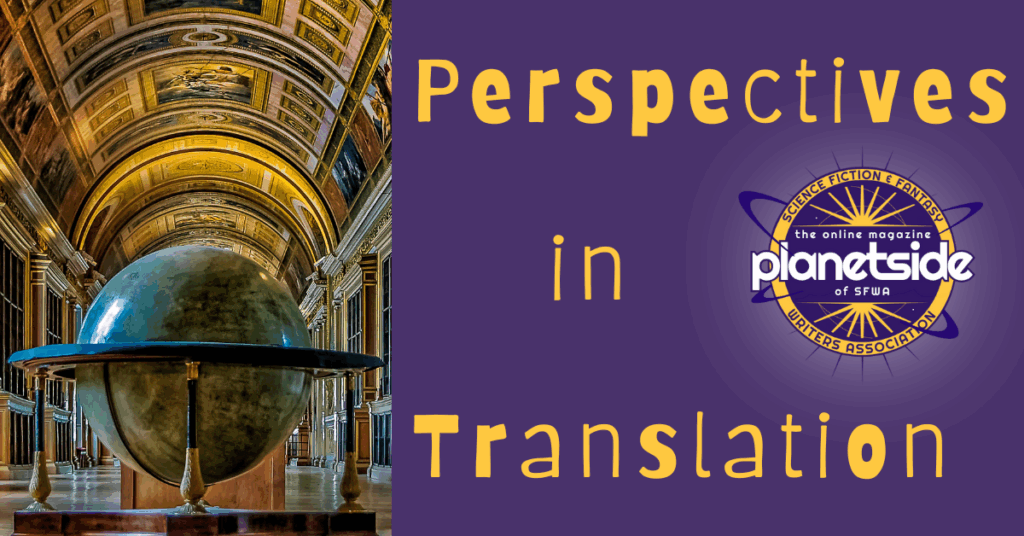Planetside Full Archives

Planetside: The Online Magazine of SFWA
Protecting Your Intellectual Property: What You Need to Know About Copyright
Writing Sword Fights: Three Tips from a Professional Swordsman
Where Is All the SFF Theater?
Happy 90-Something, Dear Paperback. Here’s Hoping You Survive to 100
Seven Lessons for My Past Self on Running a Small Press
SFWA Presents: Get to Know…Writer Beware® (Part 2: Challenges and Advocacy)
SFWA Presents: Get to Know…Writer Beware® (Part 1: History and Mission)
SFWA Presents: Get to Know…Our Showcase Series
Ink Stains on Fingers and the Smell of Coffee: A Guide to Writing Elsewhere
Translating Speculative Fiction into a Language with Many Dialects
Poetry in Print: Shaping Your Own Chapbook
Using Pop Culture as Poetic Inspiration
by Gwynne Garfinkle Pop culture such as movies, TV shows, music, and graphic novels can be a great source for poetic inspiration. A poet can critique, explore, and riff on a pop-culture work they love (or hate!) or even use…
How Many Poems Does It Take to Make You a Poet?
by Brenda Gates Spielman When my first book was published in 1979, I had no difficulty describing myself as an author. I even won an argument with a friend about whether it took more than one book for such a…
Moral Rights: What Writers Need to Know
by Victoria Strauss of WRITER BEWARE® What Are Moral Rights? In addition to various economic rights, such as the ability to license and profit from the use of their original work, the Berne Convention (the international source for copyright law)…
Introducing Planetside: The Online Magazine of SFWA
by Roxana Arama, Lead Editor For nearly 30 years, The SFWA Blog has been an essential resource for speculative fiction creators. Our editorial team is excited to begin a new chapter on July 1, 2025, reintroducing our publication with a…
Awards in Speculative Poetry: Ways (and Reasons) to Celebrate Excellent Writing
by Brian U. Garrison A poem doesn’t need an award to have impact. But the process of celebrating builds community, excitement, and audience. With the Hugo and Nebula Awards preparing space in their victory gardens for poetry, new gateways are…
What Should I Pitch to Planetside?
by the Planetside Crew In recent years, Planetside: The Online Magazine of SFWA has undergone many changes and refinements to serve its community better. Where we once had a single editor, we’re now a team that reviews pitches collectively and looks…
Think Like a Horror Writer to Create Better Villains
by Michael J. Moore You write speculative fiction for the same reason you’ve read or watched it your entire life. There’s something inside of you that craves tales of relatable characters overcoming adversity. It’s your inner hero, and it manifests…
So, you think your publication is working to advance equity in SFF?
by Sabrina Vourvoulias First, a quick quiz: Did you read the headline, and automatically compile a mental checklist of the authors and staffers from underserved communities you’ve published or hired? Congrats, but … you were gauging diversity. Did you…
Persistence
Odyssey Announces Online Classes
How to Use a Scheduling Tool With Your Social Media
Research Tool: Random name generators and lists
Fantasy Worldbuilding Questions: Daily Life
By Patricia C. Wrede General How do ordinary people feel about foreigners? Non-humans? How ready are they to accept different ideas? How cosmopolitan are they? How much social mobility is there? Is it easy or hard for a person born…
The SFWA Blog
Characterization and Worldbuilding Through Fight Scenes
by Corrine A. Kumar Fight scenes aren’t just about fighting. While writing technically accurate and action-packed fight scenes is important, if we don’t keep the focus on our characters and our worlds, readers will just skim past them. Fight scenes…
Enriching Your Worldbuilding with Economics
by Albert Zhang Science fiction is often much more concerned about the physical than the organizational reality of a setting (and that’s understandable). But a good fundamental economic story can facilitate plot development and lend realism to a setting. To…
What Should I Pitch to The SFWA Blog?
by the SFWA Publications Crew In recent years, The SFWA Blog has undergone many changes and refinements to serve its community better. Where we once had a single editor, we’re now a team that reviews pitches collectively and looks for…
The Professional Editor/Writer Relationship
by Ira Nayman Early in my short-story writing career, I received a delightful email from an anthology editor who had accepted one of my works. “The hard part is over,” she wrote. “Your story has been accepted. Compared to this,…
History in Speculative Fiction: Repeat, Rhyme, or Echo?
by Aaron H. Arm There’s an adage that people like to bring up when discussing current events: “History doesn’t repeat itself, but it often rhymes.”* It’s a fair assessment, actually. Everything is confined to the context of its time, after…
Translation for Video Games: An Interview with Kristin Osani
by Misha Grifka Wander Editor’s note: This piece is part of the series Perspectives in Translation, where creators discuss the many facets and challenges of translating fiction. The terms “source language” and “target language” will be used throughout this series….
Translation vs. Adaptation: The Continuous Struggle for Optimal Ratio
by Elena Kovalenko Editor’s note: This piece is part of the series Perspectives in Translation, where creators discuss the many facets and challenges of translating fiction. The terms “source language” and “target language” will be used throughout this series. If…
Enriching Characters and Sociopolitics with Digital Currencies
by Libby Schultz The future of digital currencies offers science fiction writers a unique opportunity to enhance their worlds. As a fintech founder and entrepreneur in the crypto industry, I navigate these topics daily alongside regulators, innovators, and organizations. Related…
The Many Alt-Histories of World War II
by Jeremy Zentner Fifty million dead, continents in ashes, and the emergence of a global struggle between two superpowers: World War II changed the path of history forever. It’s only natural that it would be a hot topic for historical…
Only as Good as Our Tools: Drafting by Hand and Fountain Pens
by Carrie Finch Editor’s note: This piece is part of a series titled Writing by Other Means, where authors share personal experiences and industry intel around different production contexts and writing tools. Painters have brush and canvas. Dancers have mirrors…
The Revolution Will Be Fantasized
by Samuel Poots In 2009, I met my hero. I was eighteen, painted blue, and wearing a borrowed kilt, a brave choice for November in Ireland. At the other end of a line of eager fans sat a man with…
The Dangers of Writing on Someone Else’s Heartstrings
by Marie Croke As speculative fiction authors, we twist and remake reality. Yet, when it comes to retelling events or using fiction to manipulate a real-life person’s biography, those places we’re remaking were someone’s home, those events were often the…
Using Archives to (Re)Write History
by Anneke Schwob I’ve spent a lot of time in archives and special collections: parsing handwritten letters, transcribing diaries, puzzling over telegraphs and radio transmissions. I was trying to write a dissertation. But inside the climate-controlled sterility of the reading…
Writing Alt-History? Read the Primary Sources
by Austin Conrad Online media is my preferred starting point when seeking historical inspiration for my game writing—especially my recent fixation on King Arthur. If you use a discerning eye, the internet’s free resources are flush with useful information. For…
Sudden: Writing on the Go
by Eugen Bacon Editor’s note: This piece is part of a series titled Writing by Other Means, where authors share personal experiences and industry intel around different production contexts and writing tools. You have a novel, a novella, a short…
QA and Storytelling in Video Games
by John Ryan When you hear about narrative in video games, positions such as writers and narrative designers might be the first roles you’ll think of. What people don’t think about is one of the most important roles in the…
Playtesting TTRPG Stories
by Austin Conrad Tabletop role-playing games (TTRPGs) are built from basically two elements: game mechanics and narrative. Unlike video games, TTRPGs strongly focus on collaborative narrative between the players and the gamemaster at the table. Playtesting the narrative of a…
Playtesting Card Games
by Marie Vibbert Every three months, the Cleveland Game Developers host a Play Test Night for our members. Last time, I got to play a card game. It drove home the crucial differences between video games and physical games that…
Playtesting Narrative Content in Board Games
by Will McDermott Writing narrative content for board games is different from any other writing I’ve ever done. It’s even different than writing for video games or role-playing games. The reason is simple: length. Novel and short story authors have…
Quark – A SFWA Public Digest
A quark (/kwɔːrk, kwɑːrk/) is a type of elementary particle and a fundamental constituent of matter. In an effort to maintain transparency and foster communications with all members of the SFF community and the public, SFWA would like to introduce…
The Inexorable Growth of BIPOC in Publishing
by Emily Jiang AN INTRODUCTION OF SORTS: To Boldly Go Where I Have Never Gone Before “We often fear what we do not understand. Our best defense is knowledge.” –Tuvok Over 15 years ago, when I enrolled in an MFA…
Introduction to Game Writing and Playtesting
by John Dale Beety In science fiction and fantasy (SFF) terms, game writing is exactly what it sounds like: writing for games. Calling oneself a game writer, however, is akin to declaring oneself a scientist. Divisions within game writing include…
The Past Is Not as Rosy as You’ve Been Led to Believe
by Jeff Reynolds A game we authors enjoy is “discuss how the short story market used to pay so well you could make a living from it.” When the topic appeared again recently, I wondered: Is there any truth to…
Game Writing with Text Adventure Games
by Misha Grifka Wander When I teach video game analysis to college students, I sometimes tell them that they’re going to make their own games—and their eyes glaze over in panic, thinking of the intense production requirements of a video…

